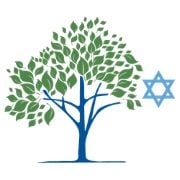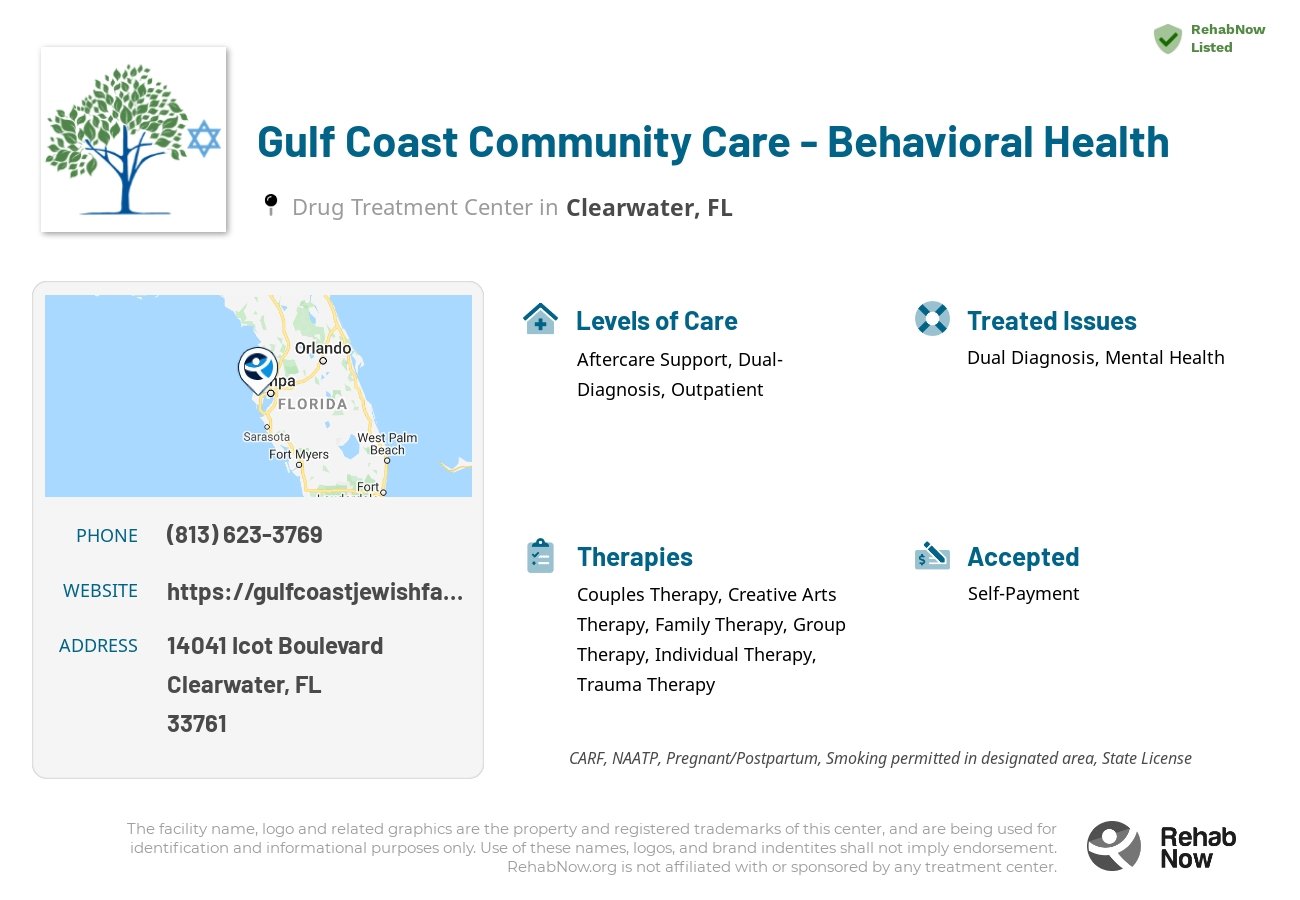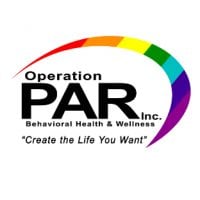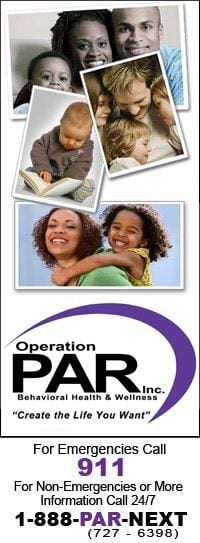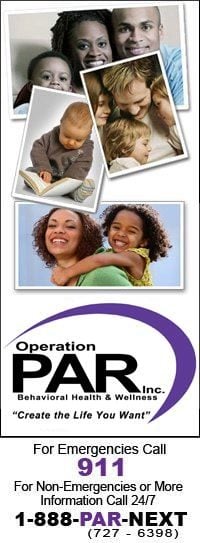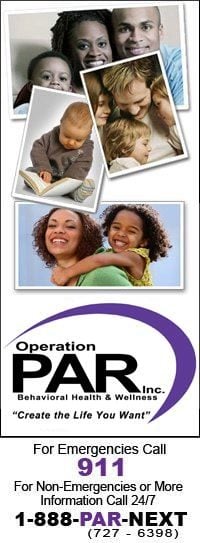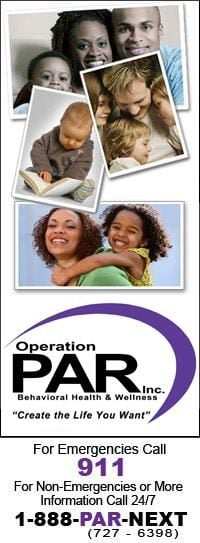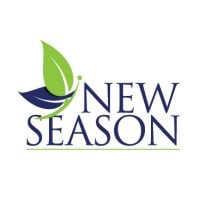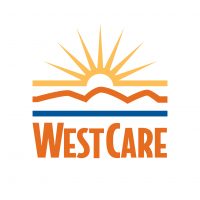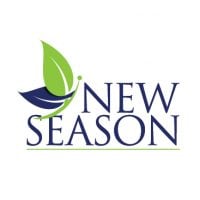Gulf Coast Community Care - Behavioral Health
Drug Rehab Center in Clearwater, Florida
Gulf Coast Community Care - Behavioral Health is an accredited, highly respected Addiction Treatment Facility located in Clearwater, FL that has been providing quality care since 1960, specializing in Dual Diagnosis and Mental Health/Substance Abuse issues as well as offering Drug Addiction services with Aftercare Support and various levels of Outpatient Care, all backed by a majority of Private Health Insurance plans.
About Gulf Coast Community Care - Behavioral Health in Florida
Gulf Coast Community Care - Behavioral Health is an addiction treatment facility located in Clearwater, Florida. Established in 1960, this facility specializes in providing comprehensive care for individuals suffering from dual diagnosis, mental health disorders, substance abuse, and drug addiction. Gulf Coast Community Care - Behavioral Health is accredited by CARF (Commission on Accreditation of Rehabilitation Facilities), which ensures that they meet rigorous standards of quality and effectiveness in their treatment programs. They accept private health insurance, making their services accessible to a wider range of individuals seeking help.
At Gulf Coast Community Care - Behavioral Health, individuals struggling with addiction and substance abuse can find a range of services to support their recovery journey. The facility offers aftercare support, which helps individuals transition back into their daily lives after completing their treatment. Additionally, they provide dual-diagnosis treatment, addressing both mental health disorders and substance abuse simultaneously for a more comprehensive approach. With outpatient levels of care, they offer flexibility in treatment options, allowing individuals to receive the necessary support while still maintaining their daily responsibilities. By combining evidence-based therapies and personalized treatment plans, Gulf Coast Community Care - Behavioral Health aims to provide individuals with the tools and resources they need to overcome their addiction and achieve lasting recovery.
Genders
Ages
Modality
Additional
Accreditations

CARF
The Commission on Accreditation of Rehabilitation Facilities (CARF) is a non-profit organization that specifically accredits rehab organizations. Founded in 1966, CARF's, mission is to help service providers like rehab facilities maintain high standards of care.
Conditions and Issues Treated
A combination of treatments is often needed to treat drug abuse. Some addictions can be treated with counseling and support groups. In other cases, drug abuse can lead to a medical problem and require medical treatment. Treatment for drug addiction typically combines counseling and psychotherapy with medication and behavioral therapies.
A combination of treatments is often needed to treat drug abuse issues effectively. In the case of drug abuse, there is no easy answer or one-size-fits-all cure.
When someone in struggles with both addiction and mental or emotional illness, this is considered a dual diagnosis. Dual diagnosis treatment can include therapy for these issues to happen simultaneously, which will allow either of them to be treated effectively.
Sometimes people who have suffered from addiction disorder also suffer from co-occurring disorders such as depression, anxiety, bipolar disorder, etc., making them “dual diagnoses.” Dual diagnoses require specialized treatment programs where drug and alcohol addiction are addressed along with psychiatric illnesses. Some rehabilitation facilities provide patients suffering from cooccurrences a program with highly integrated services and a clean environment with few distractions to help them succeed.
Levels of Care Offered
This center offers a variety of custom treatment tailored to individual recovery. Currently available are Aftercare Support, Dual-Diagnosis, Outpatient, with additional therapies available as listed below.
Outpatient treatment is often used for drug addicts in drug rehab. Outpatient treatment consists of counseling and therapy sessions. This form of treatment is also called ‘day-treatment’. The outpatient treatment process begins with the addict’s initial detox period, lasting about ten days.
Outpatient treatment is used for those who are at moderate risk for ‘slipping back’ into the addiction, for those who:
- Are not currently experiencing any side effects from withdrawal and can handle social pressure
- Can handle stressors that might trigger relapse
- Have a stable living environment or have moved out of their previous environment, which was not conducive to being sober
- Have a support system that allows them to go to a facility a few times a week while still keeping their current responsibilities
- Have no legal obligations, being either on parole or probation, that require them to seek treatment at a mandatory facility
- Are not currently experiencing any side effects from withdrawal and can handle social pressure
- Have a stable living environment or have moved out of their previous environment, which was not conducive to being sober
Completing a drug or alcohol rehab program is only the first step. Then comes aftercare support. These services include sober living accommodations, career counseling, and AA/NA programs for those struggling with sobriety or who want help maintaining it after initial rehab at an addiction facility.
They can last up to a year or more depending on what’s needed most urgently after the earlier stages are completed.
Therapies & Programs
Because no single treatment is effective for all addicts, the goal of treatment and therapy should be to figure out what works best for each individual. Tolerance and withdrawal levels differ from person to person, affecting the treatment intensity required. Addiction treatment should aim to help addicts develop healthy coping mechanisms for dealing with their addiction and its underlying causes.
Couples therapy works with clients and significant others in a professional capacity to improve relationship dynamics. This can be helpful for addicts who are trying to marry the idea of recovery into their work, family, social lives – any aspect that has to do with relationships. Through counseling sessions, addicts will have an opportunity to talk about their addiction with professional partners.
Family therapy is beneficial for people who are in addiction treatment services because it offers addicts the opportunity to work with their family members to better understand what led them to make choices that contributed to their addiction.
This type of therapy helps family members reach a deeper understanding of how they can best support their loved one during recovery. It also helps the addict better understand their own motivations and triggers that led them to turn to substance abuse.
Family therapy can help addicts in the following ways:
- Assists family members in processing difficult feelings so they don’t blame or resent recovering addicts
- Assists family members in understanding how addiction has impacted the addict and everyone who is involved with them
- Allows the addict to take responsibility for their actions, while encouraging improved communication skills
- Helps family members understand how to best support an individual in recovery so addicts don’t relapse again.
Group therapy can help build a stronger support system and give addicts in Clearwater, FL insight into their addiction that they gain through shared conversations. Group therapy occurs in a controlled group environment, exclusive of one on one meetings. This makes it safer for patients to feel comfortable sharing the struggles they’re going through and gaining perspective.
Trauma therapy is beneficial for people who are recovering from drug addiction because it helps them heal from past traumas that may have caused them to turn to harmful substances or led them to experience negative emotions that contributed to their destructive behaviors.
This type of treatment works by processing difficult experiences so individuals can learn how to process these events without having to turn to substances for coping.
Trauma therapy can help addicts in the following ways:
- Helps individuals understand their experiences and emotional responses to difficult events, including why they turned to drugs or alcohol
- Provides them with comfort and support while working through difficult emotions related to these traumatic experiences
- Offers an opportunity for addicts to have a voice and be heard, which can improve their self-esteem
- Can help them develop coping skills so they can better respond to triggers instead of turning to substance abuse.
Cognitive-behavioral therapy is a technique that is used to help people with addiction. Specifically, it is a way of identifying thoughts and behaviors that cause the addiction. It is typically used in an individual counseling session.
The content explains cognitive behavioral therapy and how it works to address some behaviors that may be leading to unintended consequences in their life, as well as its benefits for those seeking sobriety.
It works by helping people to talk through their issues and addressing the thoughts that cause said behaviors. It is an excellent way of learning about oneself and one’s perception of the world.
Payment Options Accepted
For specific insurance or payment methods please contact us.
Is your insurance accepted?
Ask an expert, call (888) 674-0062
Additional Details
Specifics, location, and helpful extra information.
Clearwater, Florida 33761 Phone Number(813) 623-3769 Meta DetailsUpdated November 25, 2023
Staff Verified
Gulf Coast Community Care - Behavioral Health Patient Reviews
There are no reviews yet. Be the first one to write one.
Clearwater, Florida Addiction Information
Florida is one of the nation's epicenters for substance abuse and drug-related overdoses. In 2014, around 410,000 Florida residents were addicted to drugs and alcohol. Over the last 10 years, 12% of all deaths in the state were attributed to substance abuse. Treatment admissions for alcohol reached 24,329 patients in 2016, and 2.5% of Florida high school students admitted to using crack cocaine.
The City of Clearwater, Florida has a high rate of drug use and abuse. The most commonly abused drugs include cocaine, heroin, and marijuana. Alcohol is the most common substance abused by adults aged 26 and older. In 2013, 69.8% of people in Clearwater were abusing illicit drugs. The best way to find a treatment facility in Clearwater is to ask for referrals from friends, family, or healthcare professionals.
Treatment in Nearby Cities
- Madeira Beach, FL (8.6 mi.)
- Citra, FL (110.9 mi.)
- De Bary, FL (107.8 mi.)
- Englewood, FL (68.6 mi.)
- Fruitland Park, FL (82.7 mi.)
Centers near Gulf Coast Community Care - Behavioral Health
The facility name, logo and brand are the property and registered trademarks of Gulf Coast Community Care - Behavioral Health, and are being used for identification and informational purposes only. Use of these names, logos and brands shall not imply endorsement. RehabNow.org is not affiliated with or sponsored by Gulf Coast Community Care - Behavioral Health.
